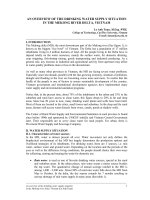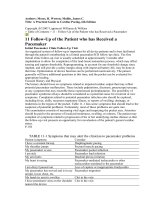Tài liệu Joint Statement of the Healthcare Coalition on Data Protection doc
Bạn đang xem bản rút gọn của tài liệu. Xem và tải ngay bản đầy đủ của tài liệu tại đây (187.01 KB, 6 trang )
Page 1 of 6 29 January 2013
Joint Statement of the Healthcare Coalition on Data Protection
Benefits of data processing in healthcare and medical sciences while protecting
patients’ personal data
Representing leading actors of the healthcare sector in Europe, the Healthcare Coalition
for Data Protection
1
would like to share their thoughts on the Commission’s proposal for
a General Data Protection Regulation.
2
The Healthcare Coalition for Data Protection welcomes the Commission’s effort to
harmonise data protection requirements in the EU. The Coalition also welcomes the
provisions supporting healthcare and health research. However, some areas must be
improved to facilitate medical innovation, improvements in care delivery, and to support
Europe’s ground-breaking medical research for the benefits of society. Certain provisions
might restrict the sharing of health data, delay innovation, create legal uncertainty and
increase compliance costs if they remain unchanged.
1
See last page for more explanation on the Healthcare Coalition on Data Protection
2
The Healthcare Coalition on Data Protection proposes five key recommendations to
improve the General Data Protection Regulation:
1. Maintain provisions for data processing for healthcare, research and ultimately
patient safety.
2. Clarify definitions for data concerning health to allow a workable and effective
data protection regime.
3. Consider the potential unwanted consequences of the Right to be Forgotten.
4. Avoid excessive administrative burden linked to impact assessment obligations.
5. Clarify rules and definitions around the concept of consent.
Page 2 of 6 29 January 2013
DETAILED BRIEFING
1. Maintain provisions for data processing for healthcare, research and
ultimately patient safety
Today’s modern information-based healthcare systems rely on data processing to deliver
quality care. The availability of health data through the healthcare cycle is crucial for
delivering quality care, clinical research, public health research, improving the quality of
patient-centred healthcare services and reducing costs. ICT, electronic health records
and mobile technologies are increasingly connecting all parts of the system delivering
more personalised ‘citizen-centric’ healthcare, which is more targeted, effective and
efficient.
3
Underpinning this emerging ecosystem is data. Not only is data crucial to
responding to patient needs, but it also helps in defining public health policy
development.
To capitalise on these benefits, it is vital that the EU strikes an appropriate balance
between facilitating the secure use of health data for health purposes and patients’ rights
to privacy.
The Coalition recommends the provisions of article 81 and 83 are maintained and
clarified as the Regulation moves through the legislative process.
2. Clarify definitions for data concerning health to allow a workable and
effective data protection regime
Anonymised, and pseudonymised or key–coded data are used to conduct medical
research, monitor the efficiency of treatments, monitor disease trends, support public
health policies, etc.
The Coalition recommends:
• Amending Article 2 (material scope of the Regulation), to make explicit that the
principles of data protection should not apply to data rendered anonymous (as
recognised in Recital 23)
• Introducing a definition of anonymised data in Article 4(2) (b) and
pseudonymised data in Article 4(2) (a).
• Adopting a proportionate approach to the use of pseudonymised data that
recognises the context and the risk of re-identification to ensure a risk-based
approach, as reflected in the opinion 4/2007 of the Article 29 Working Party
Opinion
4
. In addition, the Regulation should create incentives for using
pseudonymised data, by relieving certain restrictions.
• To ensure legal clarity, the regulation must ensure consistency with other EU
legislation. For instance certain types of data (e.g. location data, online
identifiers as defined in article 4(1), are already covered by the e-privacy
Directive 2002/58EC, creating confusion.
3. Consider the potential unwanted consequences of the Right to be
Forgotten
3
eHealth Action Plan 2012-2020 – Innovative healthcare for the 21
st
century, COM (2012) 736 final
4
/>
Page 3 of 6 29 January 2013
Implementing the right to be forgotten and to erasure in the healthcare context requires
careful consideration of the consequences:
• Deleting data from electronic health records may run counter to individual
treatments and patient safety: healthcare providers will not have access to life-
saving information on the patient when establishing a diagnosis, such as allergies,
ongoing treatments, specific conditions (e.g. diabetes), blood type, medical
history, organ donation, etc.
• Statistical analyses might be weakened, particularly in the case of orphan
diseases or conditions with difficult inclusion and exclusion criteria, such as
paediatrics.
We are concerned that whilst Article 17(3)(b) provides an exemption ‘for reasons of
public interest in the area of public health’, it is not clear whether this exemption applies
to healthcare provision.
The Coalition recommends that Article 17(3) (b) is clarified in order to exclude the
possibility of erasing data concerning health.
4. Avoid excessive administrative burden linked to impact assessments
obligations
A key objective of the reform is to make data controllers accountable for their processing
of personal data, while avoiding excessive administrative burden. However a few
provisions risk creating legal uncertainty and bureaucratic complexity:
• Article 33 requires that the processing of data concerning health is subject to the
data protection impact assessment requirement, but the criteria for impact
assessments are not defined and may be clarified by delegated act (Article 33
(6)).
• In addition, while Article 34 prohibits certain processing of personal data before
approval by the supervisory authority, it does not specify the timelines for the
approval process. Legal certainty concerning the approval process of supervisory
authorities is crucial for stakeholders.
The Coalition recommends:
• Article 34 should mirror the principles outlined in recital 74: mandatory prior
consultation should only be foreseen for:
o Very limited processing activities, which could be privacy invasive and
which differ significantly from existing processing activities
o Risky processings which might obviously not be in compliance with the
Regulation.
• Article 34 should set out a clear timeline for the approval of supervisory
authorities
• A single data protection assessment should be permitted to cover similar
processing activities and activities which present similar privacy risks.
• Impact assessments should not be “one-size-fits-all”. Under a principle of
accountability, organisations should be able to adopt impact assessments,
appropriate to their type of organisation and processing activities, legal
requirements and contractual obligations. The delegated and implementing acts
(Article 34 (8-9)) should be deleted.
Page 4 of 6 29 January 2013
• Impact assessments should not constitute disproportionate and unsustainable
administrative and financial burden to small and medium sized medical practices.
5. Clarify rules and definitions around the concept of consent
The Coalition warmly welcomes high visibility of consent in the draft Regulation, and
endorses the philosophy that consent is the basis of trust. However the lack of clarity on
the way in which consent is to be treated in the context of healthcare and research is a
matter of some concern. In healthcare, data protection should strive for an appropriate
balance between a data subject’s rights, and innovative use of information to support
research and greater patient empowerment for self management.
We believe current proposals for consent may lead to a burdensome notice and ‘opt-in’
regime for individuals, overwhelming patients with information and creating significant
resource demand.
The Coalition recommends:
• In the context of healthcare provision it is noted that Article 7(4) specifies that
“consent shall not provide a legal basis for the processing when there is a
significant imbalance between the data subject and the controller”. The current
wording might result, in the patient invoking a “significant imbalance” between
the physician and himself in order to declare the consent given void. Whilst it is
understood that in certain cases, such as employment, it is important to have
such safeguards, the Regulation should explicitly clarify that art. 7(4) does not
apply to the health sector.
• A doctor cannot provide treatment without processing patients' personal data.
The Regulation should clarify that the act of seeking and agreeing to treatment
should be considered as equal to ’explicit consent’ in these contexts, and as per
Article 4(8) and Article 7(1). This clarification would also avoid red tape.
• In the case of medical research, it should be noted that specific consent is not
compatible with the approach taken in many research studies, where a broad
consent model is used. There are also cases where it is difficult or impossible to
secure consent. Article 83 provides an alternative legal basis for processing for
research under which consent for processing of appropriately-protected data will
not be required. It is therefore particularly important that Article 83 and the
associated rules are clear and maintained in all delegated legislation.
Page 5 of 6 29 January 2013
The Healthcare Coalition on Data Protection gathers:
CED:
The Council of European Dentists (CED) is the representative organisation of the dental
profession in the European Union, representing over 340,000 practicing dentists from 32
national dental associations and dental chambers in 30 European countries. Established
in 1961, the CED promotes high standards of oral healthcare and effective patient-safety
centered professional practice across Europe and contributes to the safeguarding and the
protection of public health.
HOPE:
HOPE, the European Hospital and Healthcare Federation, is an international non-profit
organisation, created in 1966. HOPE represents national public and private hospital
associations and hospital owners, either federations of local and regional authorities or
national health services. HOPE mission is to promote improvements in the health of
citizens throughout Europe, high standard of hospital care and to foster efficiency with
humanity in the organisation and operation of hospital and healthcare services.
FEAM:
The Federation of European Academies of Medicine (FEAM) represents national
academies in 14 EU member states. Its mission is to promote cooperation between the
national Academies of Medicine and to extend to the political and administrative
authorities of the European Union the advisory role that the Academies exercise in their
own countries on matters concerning medicine and public health.
COCIR:
COCIR represents the Radiological, Electromedical and Healthcare IT industry in Europe.
COCIR encourages the use of advanced technology to support healthcare delivery
worldwide and promotes free worldwide trade of medical devices and maintaining the
competitiveness of the European health sector.
EFPIA:
The European Federation of Pharmaceutical Industries and Associations
(EFPIA) represents the pharmaceutical industry operating in Europe. Through its direct
membership of 33 national associations and 37 leading pharmaceutical companies, EFPIA
is the voice on the EU scene of 1,900 companies committed to researching, developing
and bringing to patients new medicines that will improve health and the quality of life
around the world. EFPIA supports a vision of modern and sustainable healthcare systems
in Europe, where patients have equal and early access to the best and safest medicines,
which supports innovation, empowers citizens to make informed decisions about their
health and ensures the highest security of the medicines supply chain.
Continua Health Alliance:
Continua Health Alliance is a non-profit, open industry organization of healthcare and
technology companies joining together in collaboration to improve the quality of personal
healthcare. With more than 220 member companies around the world, Continua is
dedicated to establishing a system of interoperable personal connected health solutions.
GSMA:
The GSMA represents the interests of mobile operators worldwide. Spanning more than
220 countries, the GSMA unites nearly 800 of the world’s mobile operators with more
than 230 companies in the broader mobile ecosystem, including handset makers,
software companies, equipment providers and Internet companies, as well as
organisations in industry sectors such as financial services, healthcare, media, transport
Page 6 of 6 29 January 2013
and utilities. The GSMA also produces industry-leading events such as the Mobile World
Congress and Mobile Asia Expo.
mHealth is one of the focus areas of the GSMA’s Connected Living programme, a market
development initiative that is designed to help operators accelerate the delivery of new
mobile connected devices and services. The purpose of the GSMA’s mHealth initiative is
to support cost-effective delivery of better healthcare for everyone.
For more information, please visit the GSMA corporate website at www.gsma.com or
Mobile World Live, the online portal for the mobile communications industry, at
www.mobileworldlive.com.
CPME:
The Standing Committee of European Doctors (CPME) represents national medical
associations across Europe. We are committed to contributing the medical profession’s
point of view to EU and European policy-making through pro-active cooperation on a
wide range of health and healthcare related issues.
We believe the best possible quality of health and access to healthcare should be a
reality for everyone. To achieve this, CPME promotes the highest level of medical
training and practice, the safe mobility of physicians and patients, lawful and supportive
working conditions for physicians and the provision of evidence-based, ethical and
equitable healthcare services. We offer support to those working towards these
objectives whenever needed.
We see the patient-doctor relationship as fundamental in achieving these objectives and
are committed to ensuring its trust and confidentiality are protected while the
relationship evolves with healthcare systems. Patient safety and quality of care are
central to our policies.
We strongly advocate a ‘health in all policies’ approach to encourage cross-sectorial
awareness for and action on the determinants of health, to prevent disease and promote
good health across society.
CPME’s policies are shaped through the expertise provided by our membership of
national medical associations, representing physicians across all medical specialties all
over Europe and creating a dialogue between the national and European dimensions of
health and healthcare.









